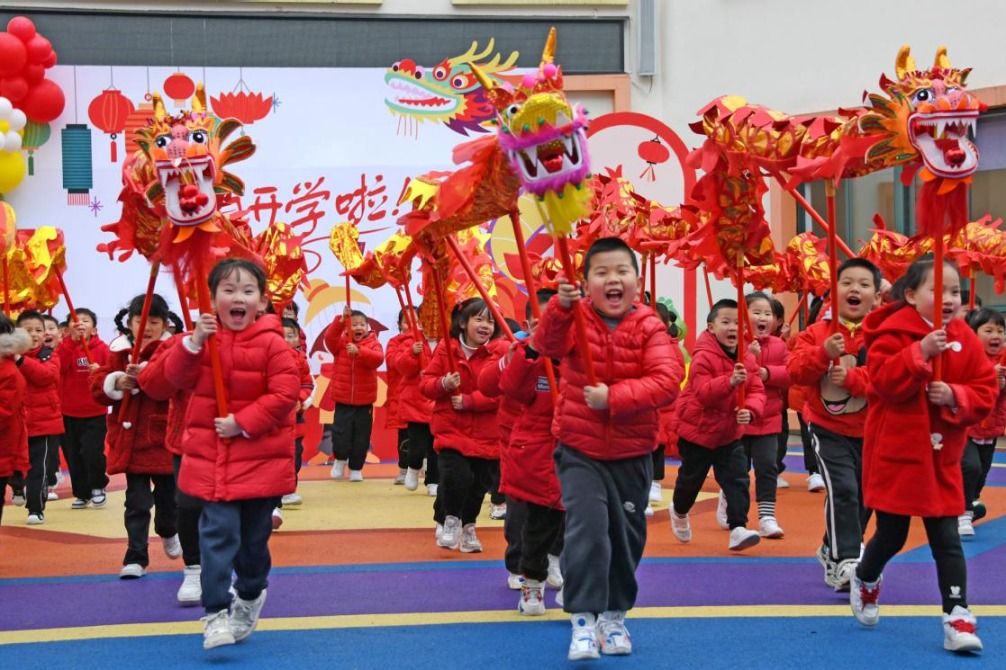Crunch time? 关键时刻
中国日报网 2020-01-21 13:04

Reader question:
Please explain “crunch time” in this sentence: During crunch time, we can see an increase in production of 15%.
My comments:
Crunch time refers to pressure time, a period of time when things to be done must be done.
In our example, if we are talking about a factory, crunch time may very well refer to, say, five days before the end of a month when production targets must be met.
During this time, you can see workers in overdrive, working hard and working overtime.
Hence, productivity rises by up to 15 percent, which is a lot.
Anyways, the American expression “crunch time” refers to pressure time, when everybody feels the squeeze, so to speak.
Or, literally, feel the crunch or bite, when something is crushed between the teeth.
Journalists having to finish a lengthy investigative report before a deadline, for example, are facing crunch time. Students before an exam are facing crunch time. The last minutes or seconds of a close ball game, for another instance, are called crunch time.
Magic Johnson, the star of the Show Time Lakers basketball team of the 1980s, called crunch time “winning time”, when a close-fought game is won.
Or, for that matter, lost.
Magic called it winning time because, for him, winning happened far more often than not.
For lesser players, crunch time may just be pressure time, when they feel all the pressure and fear of losing but none of the excitement and exhilaration felt by Magic.
Well, Magic being Magic, we’re not going to fault him for seeing just one side of the coin when it comes to crunch time.
Okay, to sum up again, crunch time is pressure time, when a deadline is to be met, when crucial decisions have to be made, when things to be done must be done, when everything, as a matter of fact, comes to a head.
Here are media examples:
1. A new University of Washington study found college students – only weeks away from final exams and in the library – tend to pare use of electronics. It’s their way to manage technology that permeates their lives.
Today’s students may often be considered “heavy multitaskers” who are unable to concentrate on one activity at a time. However, based on 560 interviews in 11 college libraries around the country near exam time last spring, researchers found most students using only one or two technology devices to support only one or two activities at a time — coursework and to a lesser extent, communication.
“Our findings belie conventional wisdom about the multitasking generation – always online, always using a variety of IT devices to communicate, game and do their homework,” said Alison Head, a research scientist at the UW Information School who co-directed the study. “Our findings suggest students may be applying self-styled strategies for dialing down technology when the pressure is most on them.”
Many students were using the library as a refuge and to limit technology-based distractions, such as Facebook. Few had used books, electronic or print resources, or librarians in the previous hour.
Most said they were in the library because it was the best place they could concentrate, feel more studious and take advantage of library equipment, such as computers and printers. Almost 40 percent had used the library’s computers or printers; the rest depended on materials and devices brought with them.
The researchers also found that students use Facebook as a reward after 15, 30 or 60 minutes of study. During the interviews, one student said, “If I get done reading a chapter, then I get on Facebook as a reward.”
But while students pare down to essential technology at crunch time, some were inventive in the way they had used it earlier. Two thirds said they had used social media for coursework during the term. In post-interview discussions, students mentioned Facebook for coordinating meetings with classmates, and to a lesser extent, YouTube tutorials to understand material not clear in either textbooks or classroom instruction.
“I am no longer bound by what the professor gives me in a class, and his perspective on something,” said one student. “There are lots of engineering forums that I can just Google.”
Students were inventive in other ways as well. One said she used her smart phone to record lecture notes so she could listen again and again. Another student said he photographed problem sets from a library-reserve copy of a math book he couldn’t afford. He planned to study the problem sets while riding a bus. Yet another used a website, StudyBlue, to create flashcards to review on her smart phone.
“The means by which students learn is fundamentally changing,” Head said, “and educators from kindergarten all the way through graduate school must recognize it.”
In some cases, students said they left laptops at home to avoid temptation, and relied on library equipment to write papers or study. And again, despite the vast amount of information available on the Web, 61 percent of students had only one or two websites open.
- College students limit technology use during crunch time, Washington.edu, October 12, 2011.
2. There’s a good possibility that you need a day (or two, or more) off work. NPR, the Robert Wood Johnson Foundation, and the Harvard T.H. Chan School of Public Health conducted a poll and found that about half of Americans who work fifty-plus hours a week don’t take all or most of the vacation they’ve earned. Of those who do take time off, about 30 percent say they do a significant amount of work during what’s supposed to be their hard-earned leisure time.
In a driven, competitive work culture, it can be difficult to ask for days off. And yet, taking a vacation is rejuvenating. Scheduling time to relax and leave workplace stress behind for a while means you’re more likely to return to your job with renewed creative energy and motivation, which ultimately makes you more productive. Here’s how to ask for time off the right way.
Planning Your Time Off Request
To ensure that you stay on good terms with your boss and coworkers, it’s important to put a little forethought into your vacation request.
Give advance notice
Don’t drop your request on your unsuspecting boss a week before you’d like to leave. Odds are good that even events you had no hand in planning—your friend’s wedding, for instance—will still allow you to ask for days off with plenty of lead time. (Of course, unexpected life events such as funerals or family emergencies are handled differently, and most managers will do their best to accommodate you.)
...
You’re asking for time off, not telling
There are people who’ll approach their manager on a Monday morning saying, “By the way, I just booked a trip to the Bahamas, so I’ll need next week off.” Don’t be that person. Nobody likes that person.
No matter how good that vacation deal you just spotted online seems, it’s never a good idea to book travel without clearing it with your employer first. Remember to ask your boss for time off, not simply tell him or her you’re taking it. A simple script might go like this:
“I have some vacation time coming, and I’d like to take a week to travel with my family. Would the week of July __ be a good time?”
Don’t ask during crunch time
If your workplace is engaged in an all-hands-on-deck scenario, it’s not an ideal time to ask for vacation, even if you’re planning for the future. When everyone’s focused on a major milestone, and potentially stressed as a result, it can seem tone-deaf to ask about your week in Maui. If possible, it’s best to wait until the dust of a major deadline has settled.
Similarly, make your vacation request during times when your boss is less likely to be stressed or busy. But don’t drop the vacation bomb when he or she might be thinking of things other than work. If it’s late Friday afternoon, and you’re anticipating spending some weekend down time, there’s a good chance your boss is, too.
- How to Ask for Days Off (And Actually Get Them), Grammarly.com, May 1, 2017.
3. Many of you don’t want to go out in the bitterly cold temperatures, but local business owners hope you do. The next few weeks of holiday shopping are crucial for small stores. We’re finding out if the forecast and this year’s timing of holidays are affecting their bottom lines.
Child’s Play Toys owner Nancy Savage is optimistic about the last few weeks of holiday shopping.
“It’s crunch time,” Savage said.
Savage says this week’s cold weather isn’t keeping customers away, and she’s had a busy few days so far.
“We’re hearty people here in South Dakota. I don’t think cold keeps people away,” Savage said.
“Cold is kind of South Dakota. We just aren’t used to it yet, but I think we’re to that point we know Christmas is going to come whether it’s cold or not,” Penny Klinedinst, owner of Simply Perfect, said.
Store owners may not worry about this weather affecting business, but Savage says this year’s late Thanksgiving is a bigger issue.
“We pretty much lost a whole week of sales,” Savage said.
With fewer shopping days this year, she says these 15 days left before Christmas could make or break a lot of stores that rely on holiday business to get through the slower and colder months of winter.
“These weeks really kind of make a big difference for the whole year,” Savage said.
- Local store owners in “crunch time” before Christmas, keloland.com, December 10, 2019.
本文仅代表作者本人观点,与本网立场无关。欢迎大家讨论学术问题,尊重他人,禁止人身攻击和发布一切违反国家现行法律法规的内容。
About the author:

Zhang Xin is Trainer at chinadaily.com.cn. He has been with China Daily since 1988, when he graduated from Beijing Foreign Studies University. Write him at: zhangxin@chinadaily.com.cn, or raise a question for potential use in a future column.
(作者:张欣 编辑:丹妮)

















 英语点津微信
英语点津微信 双语小程序
双语小程序